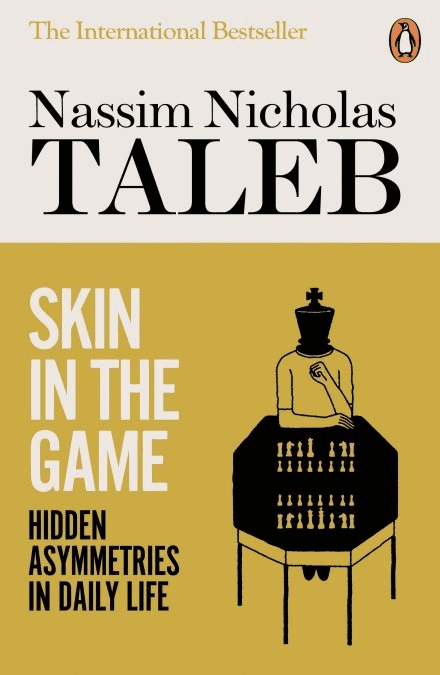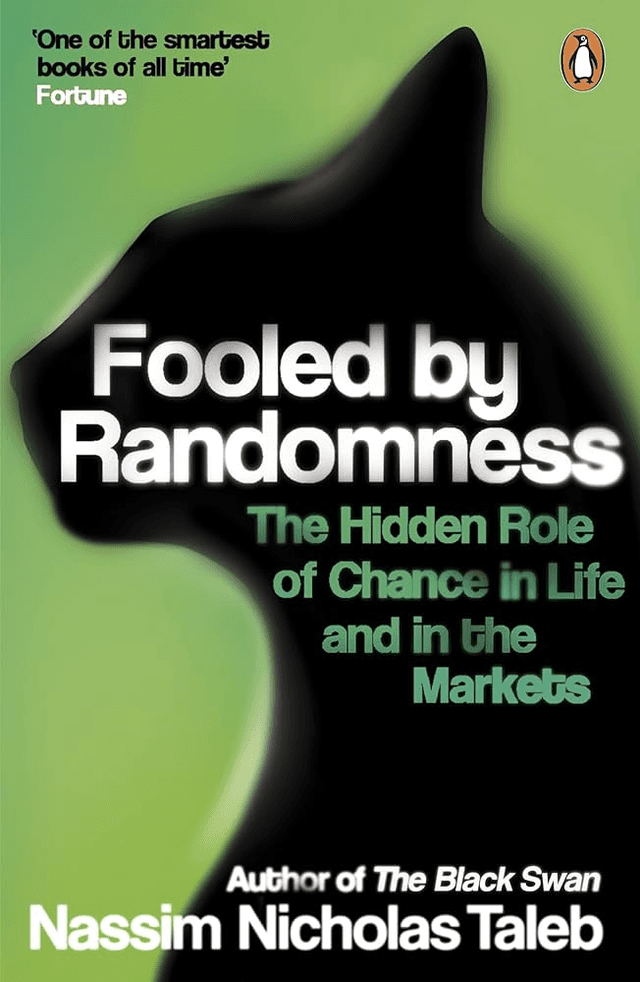Fooled by Randomness vs. Skin in the Game: Hidden Asymmetries in Daily Life
Fooled by Randomness
"Fooled by Randomness" is a thought-provoking book by Nassim Nicholas Taleb that delves into the role of chance in our lives and how we often mistake random events for meaningful patterns. Through a mix of personal anecdotes, philosophical insights, and statistical analysis, Taleb explores how randomness affects the world of finance, business, and daily life. The book challenges readers to rethink their perceptions of success, failure, and the forces that drive outcomes. This book is ideal for readers interested in finance, probability, and the philosophical implications of randomness.
Skin in the Game: Hidden Asymmetries in Daily Life
Skin in the Game: Hidden Asymmetries in Daily Life is a nonfiction book by Nassim Nicholas Taleb, published in 2018. Taleb’s main point is pretty simple: people should share in the risks of the decisions they make. If you benefit from something, you should also face the downsides if things go wrong. He calls this having “skin in the game.” Without that, people can make reckless choices that hurt others while staying safe themselves. The book covers everything from politics and business to religion and everyday life. Taleb doesn’t hold back on criticism. He talks about how some policymakers and financial experts make decisions that affect millions but don’t suffer when those decisions backfire. He uses examples like bankers profiting during booms but getting bailed out during crashes. Taleb also goes after what he calls “Intellectual Yet Idiot” types—educated people who, in his view, complicate things and give advice without understanding real-world consequences. He argues that real k...

Reviews
Reviews
| Item | Votes | Upvote |
|---|---|---|
| Engaging storytelling | 1 | |
| Thought-provoking concepts | 1 | |
| Insightful analysis on randomness and probability | 1 |
| Item | Votes | Upvote |
|---|---|---|
| Dense statistical discussions | 1 | |
| Can be repetitive | 1 | |
| Requires careful reading to fully grasp concepts | 1 |
| Item | Votes | Upvote |
|---|---|---|
| Insightful and provocative arguments | 1 | |
| Applies to various aspects of life | 1 | |
| Engaging and accessible writing style | 1 | |
| A sensible approach to ethics | 1 |
| Item | Votes | Upvote |
|---|---|---|
| Some arguments can be repetitive | 1 | |
| Taleb's confrontational tone may not appeal to everyone | 1 |
Frequently Asked Questions
'Fooled by Randomness' and 'Skin in the Game' both offer deep insights into different aspects of life and decision-making. 'Fooled by Randomness' focuses on the role of chance and randomness in our lives, making it ideal for those interested in finance, probability, and the philosophical implications of randomness. It's praised for its engaging storytelling and thought-provoking concepts, though it can be dense and requires careful reading. On the other hand, 'Skin in the Game' emphasizes the importance of personal risk in decision-making and accountability, blending philosophy, politics, and economics. It is known for its insightful and provocative arguments, though Taleb's confrontational tone may not appeal to everyone. The choice between the two depends on whether you are more interested in the philosophical implications of randomness or the ethical dimensions of personal risk and decision-making.
'Skin in the Game' is generally considered more accessible due to its engaging and accessible writing style. It applies to various aspects of life and provides a sensible approach to ethics, making it easier for a broader audience to relate to. 'Fooled by Randomness,' while also engaging, contains dense statistical discussions and requires more careful reading to fully grasp its concepts. Therefore, if you're looking for a more accessible read, 'Skin in the Game' might be the better choice.
'Skin in the Game' offers more direct insights into ethics and decision-making. The book delves into the importance of having personal risk in decision-making and accountability, blending philosophy, politics, and economics to demonstrate how personal investment is crucial for fairness and effective decision-making. 'Fooled by Randomness' primarily focuses on the role of chance and randomness in various aspects of life, making it less centered on ethical considerations. Therefore, if your primary interest lies in ethics and decision-making, 'Skin in the Game' would be the more suitable choice.
'Fooled by Randomness' is better suited for understanding the role of randomness in life. The book delves deeply into how chance affects our lives and how we often mistake random events for meaningful patterns. It offers insightful analysis on randomness and probability, making it ideal for readers interested in finance, probability, and the philosophical implications of randomness. 'Skin in the Game,' while touching on related themes, focuses more on the importance of personal risk and accountability in decision-making. Therefore, for a comprehensive understanding of randomness, 'Fooled by Randomness' is the better choice.
'Fooled by Randomness' is a thought-provoking book by Nassim Nicholas Taleb that delves into the role of chance in our lives and how we often mistake random events for meaningful patterns. Through a mix of personal anecdotes, philosophical insights, and statistical analysis, Taleb explores how randomness affects the world of finance, business, and daily life. The book challenges readers to rethink their perceptions of success, failure, and the forces that drive outcomes. This book is ideal for readers interested in finance, probability, and the philosophical implications of randomness.
Nassim Nicholas Taleb is a renowned essayist, scholar, and former trader known for his work on probability, uncertainty, and randomness. He is the author of several influential books, including 'The Black Swan,' 'Antifragile,' and 'Skin in the Game.' Taleb's work often challenges conventional wisdom and explores the impact of rare and unpredictable events on financial markets and human behavior.
Pros of 'Fooled by Randomness' include engaging storytelling, thought-provoking concepts, and insightful analysis on randomness and probability. However, some readers may find the book's dense statistical discussions challenging, and it can be repetitive at times. Additionally, it requires careful reading to fully grasp the complex concepts presented.
'Skin in the Game: Hidden Asymmetries in Daily Life' is a nonfiction book by Nassim Nicholas Taleb that argues people should share in the risks of their decisions. Taleb emphasizes that if someone benefits from a decision, they should also face the potential downsides. The book critiques various sectors, including politics and finance, highlighting how decision-makers often escape the consequences of their actions. It explores themes of accountability and the importance of real-world experience over theoretical knowledge.
Nassim Nicholas Taleb is a Lebanese-American essayist, scholar, and statistician known for his work on risk, uncertainty, and decision-making. He is the author of several influential books, including 'The Black Swan' and 'Antifragile.' Taleb's writing often critiques conventional wisdom and emphasizes the importance of practical experience in understanding complex systems.
Pros of 'Skin in the Game' include its insightful and provocative arguments, applicability to various aspects of life, engaging writing style, and a sensible approach to ethics. However, some cons are that certain arguments can be repetitive, and Taleb's confrontational tone may not appeal to everyone.
The main themes of 'Skin in the Game' include accountability, the importance of sharing risks in decision-making, the critique of policymakers and financial experts who evade consequences, and the influence of stubborn minorities on societal choices. Taleb also discusses the concept of real knowledge being derived from practical experience rather than theoretical understanding.
Nassim Nicholas Taleb's writing style in 'Skin in the Game' is direct and sometimes blunt. He is known for his no-nonsense approach, which some readers appreciate for its clarity and honesty, while others may find it overly combative or confrontational.




















